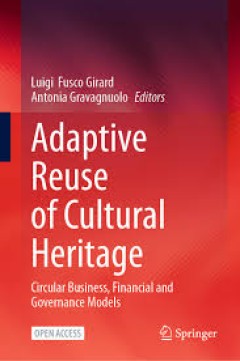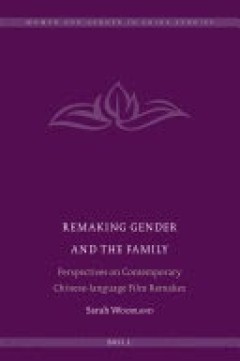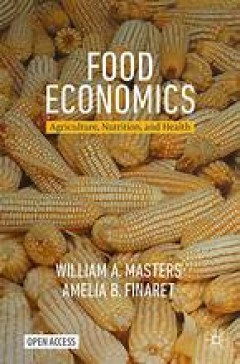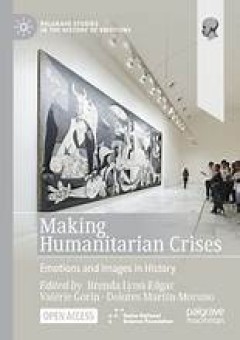Filter by

Tourism as Memory-Making = Russian Tourism in the Shadow of Empire
Until recently the Russian Federation used to be one of the largest markets for outbound travel. Among Russians’ favourite destinations were cities that used to be part of the Russian Empire and the Soviet Union, and are now located in the independent nation-states bordering Russia. This open access book provides an empirically rich and conceptually sophisticated account of the mnemonic inter…
- Edition
- -
- ISBN/ISSN
- 9783031837388
- Collation
- XV, 221 hlm,: ill, lamp; 21 cm
- Series Title
- -
- Call Number
- -

The Menstrual Movement in the Media = Reducing stigma and tackling social ine…
- Edition
- -
- ISBN/ISSN
- 9783031721946
- Collation
- X, 331 hlm; ill., lamp.,
- Series Title
- -
- Call Number
- -
- Edition
- -
- ISBN/ISSN
- 9783031721946
- Collation
- X, 331 hlm; ill., lamp.,
- Series Title
- -
- Call Number
- -

Adaptive Reuse of Cultural Heritage : Circular Business, Financial and Govern…
This open access book addresses the gap in existing knowledge on cultural heritage from a circular economy and sustainable development perspective for cities. It introduces innovative economic, environmental and governance models and evaluation tools tested and validated for adaptive reuse within the “CLIC - Circular models Leveraging Investments in Cultural Heritage Adaptive Reuse” project…
- Edition
- -
- ISBN/ISSN
- 9783031676284
- Collation
- -
- Series Title
- -
- Call Number
- -

Space, Time, Myth, and Morals: A Selection of Jao Tsung-i’s Studies on Cosm…
- Edition
- -
- ISBN/ISSN
- 978-90-04-51682-3
- Collation
- -
- Series Title
- -
- Call Number
- -
- Edition
- -
- ISBN/ISSN
- 978-90-04-51682-3
- Collation
- -
- Series Title
- -
- Call Number
- -

Up in Arms: Gun Imaginaries in Texas
Up in Arms provides an illustrative and timely window onto the ways in which guns shape people’s lives and social relations in Texas. With a long history of myth, lore, and imaginaries attached to gun carrying, the Lone Star State exemplifies how various groups of people at different historical moments make sense of gun culture in light of legislation, political agendas, and community buildin…
- Edition
- -
- ISBN/ISSN
- 9789004514676
- Collation
- 276 hlm; ill., lamp.,
- Series Title
- European Perspectives on the United States, Volume: 1
- Call Number
- -

Remaking Gender and the Family : Perspectives on Contemporary Chinese-languag…
In Remaking Gender and the Family, Sarah Woodland examines the complexities of Chinese-language cinematic remakes. With a particular focus on how changes in representations of gender and the family between two versions of the same film connect with...See More
- Edition
- -
- ISBN/ISSN
- 978-90-04-36330-4
- Collation
- -
- Series Title
- -
- Call Number
- -

Food Economics
Food Economics provides a unified introduction to the economics of agricultural production, business decisions, consumer behavior, and the government policies that shape our food system. This open access textbook begins with economic principles derived using graphical techniques to explain and predict observed prices, quantities, and other outcomes as a result of individual choices influence…
- Edition
- 1
- ISBN/ISSN
- 978-3-031-53840-7
- Collation
- oer.unej.ac.id
- Series Title
- Palgrave Studies in Agricultural Economics and Food Policy
- Call Number
- -

Resilience and Food Security in a Food Systems Context
This open access book compiles a series of chapters written by internationally recognized experts known for their in-depth but critical views on questions of resilience and food security. The book assesses rigorously and critically the contribution of the concept of resilience in advancing our understanding and ability to design and implement development interventions in relation to food securi…
- Edition
- -
- ISBN/ISSN
- 978-3-031-23535-1
- Collation
- oer.unej.ac.id
- Series Title
- Palgrave Studies in Agricultural Economics and Food Policy
- Call Number
- -

Transforming Food Systems for a Rising India
This open access book examines the interactions between India’s economic development, agricultural production, and nutrition through the lens of a “Food Systems Approach (FSA).” The Indian growth story is a paradoxical one. Despite economic progress over the past two decades, regional inequality, food insecurity and malnutrition problems persist. Simultaneously, recent trends in obesity …
- Edition
- 1
- ISBN/ISSN
- 978-3-030-14409-8
- Collation
- oer.unej.ac.id
- Series Title
- Palgrave Studies in Agricultural Economics and Food Policy
- Call Number
- -

Making Humanitarian Crises
This open access collection of essays explores the emotional agency of images in the construction of ‘humanitarian crises’ from the nineteenth century to the present. Using the prism of the histories of emotions and the senses, the chapters examine the pivotal role images have in shaping cultural, social and political reactions to the suffering of others and to the establishment of the inte…
- Edition
- -
- ISBN/ISSN
- 978-3-031-00824-5
- Collation
- oer.unej.ac.id
- Series Title
- Palgrave Studies in the History of Emotions
- Call Number
- -
 Computer Science, Information & General Works
Computer Science, Information & General Works  Philosophy & Psychology
Philosophy & Psychology  Religion
Religion  Social Sciences
Social Sciences  Language
Language  Pure Science
Pure Science  Applied Sciences
Applied Sciences  Art & Recreation
Art & Recreation  Literature
Literature  History & Geography
History & Geography